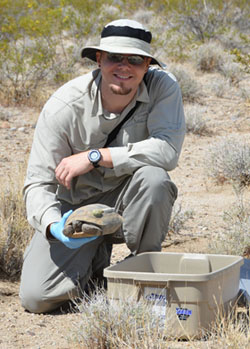Dr. Brian Todd was a postdoctoral fellow in the Hopkins Lab in 2008-2009. He worked closely with PhD student Christine Bergeron and others to study the effects of mercury contamination on amphibians along the South River in northern Virginia. His work with colleagues here resulted in the completion of several studies that increase our understanding of the physiological and ecological consequences of mercury contamination.
Brian is now a Professor at UC Davis in their Department of Wildlife, Fish, and Conservation Biology. Work in his lab primarily focuses on the ecology and conservation of reptiles and amphibians. He is interested in understanding the factors that affect the distribution, abundance, and persistence of wildlife populations.
According to Brian, “we conduct research with the goal of answering questions about the ways in which wildlife respond to a world that is rapidly changing due to anthropogenic factors like habitat loss or degradation, climate change, and the introduction of invasive species or novel pathogens.”

